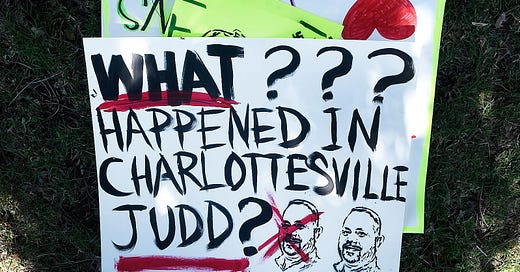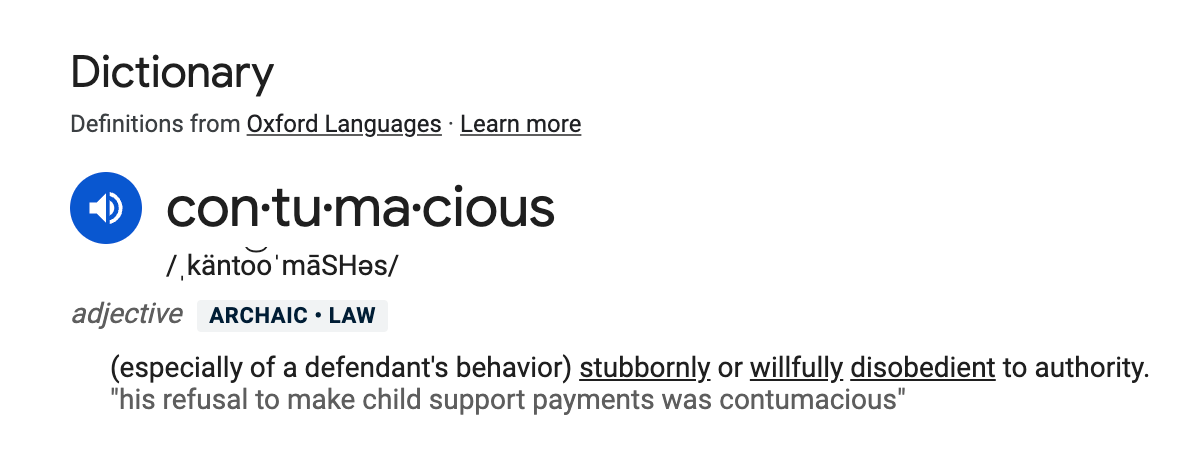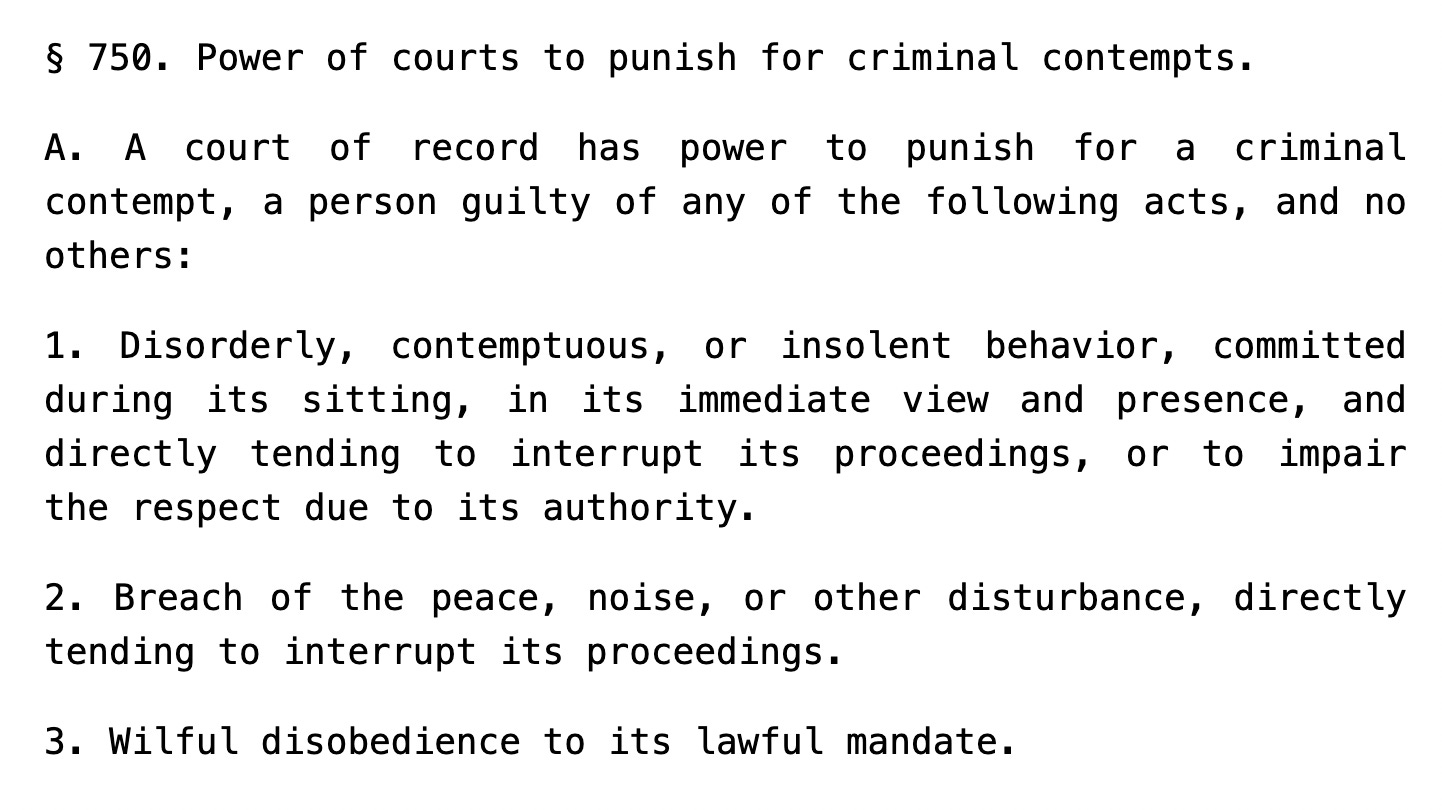This week there’s a lot on tap. There are four things in particular that I’ll be paying attention to:
In the Manhattan DA’s case, we’ll find out whether Judge Merchan’s gag order covers family members of witnesses, jurors, prosecutors, and court personnel, including the Judge’s own family members. That’s because the Manhattan DA’s office asked the court to clarify how far the order extends.
The risk to the Judge and his family is consequential. So is the risk to the integrity of the trial. The DA writes: “potential trial witnesses and prospective jurors who are not currently the subject of defendant's invective will likely fear having themselves and their family members be subject to similar attacks. This fear is not hypothetical: in the course of preparing for trial, multiple potential witnesses have already expressed grave concerns to the People about their own safety and that of their family members should they appear as witnesses against defendant.” This rationale will inevitably cause the Judge to act if Trump keeps it up.
In other words, it’s about more than the Judge and his daughter, although it’s important that they be protected. The problem with these situations is, it’s very difficult to assess when something truly bad is going to happen. No one could have predicted the attack on Paul Pelosi. And knowing the potential, if Trump didn’t want something horrible to happen, he would have stopped this long ago, or at least told his followers violence is never acceptable. The fact that he hasn’t tells you all you need to know. It’s hang Mike Pence all over again. And if you’re a witness or a juror, someone with no real long-term protection available, perhaps it’s easier just to do what Trump wants than to put your child or your spouse at risk. That, in a nutshell, is how authoritarians work after all.
I had to look up contumacious in the last paragraph, so here it is, to spare you the work:
The most interesting part of this letter is its reference to the sanction for violating the order: criminal contempt. A court can treat willful disobedience of a lawful mandate as a criminal contempt, which means that if Trump knowingly, and with an intent to violate the order requires, runs afoul of the gag order, the Judge can hold him in criminal contempt.
New York law says contempt can be punished by a fine, not to exceed one thousand dollars, and/or by imprisonment, not to exceed thirty days, in the jail of the county where the court is sitting. Given the total failure of multi-million dollar fines to constrain Trump’s behavior, custody is the only sensible approach here. The decision about punishment is left to the Judge’s discretion, and when a contempt is committed in the immediate view and presence of the court, may be punished summarily. Although there’s a good argument that the Judge’s daughter isn’t included in the current order, the DA is giving the Judge the opportunity to clarify its scope, to perhaps expand it, and to admonish Trump about the consequences of attacks on, say, witnesses, if he goes there. Courts work on this “progressive discipline” type of approach, which is increasingly frustrating since Trump takes advantage of it at every step. But it’s starting to look like he’s just about out of rope.
Last ditch delays in Manhattan
With trial only two weeks away, Trump is showing increasing signs of desperation, including an Easter Sunday ALL CAPS social media spree.
Don’t be surprised if he takes more steps, like his “new”motion to recuse the Judge. It’s new because he filed one about a year ago for more or less the same reasons. The Judge ruled against him, and that’s not the type of motion he can appeal immediately (the type of interlocutory appeal ahead of trial we’ve been seeing for issues like immunity). He can put that on the list of issues on appeal if there is a conviction. So Trump will try to argue new grounds to recuse, to avoid that procedural barrier to advancing his arguments for recusal. But the Judge sought advice from an ethics office that advises judges about conflicts before he ruled on the last motion, and it seems unlikely he’ll be persuaded by this type of blatant delay tactic. This is a Fani Willis style political attack, not something with legal force.
Also be prepared for more delay tactics this week—Trump will try to bootstrap the immunity argument on appeal in the Supreme Court here; but of course, this case is based on conduct Trump engaged in before he was president, although checks were written after he assumed office. But this is purely personal conduct.
There are also the time-honored strategies of the desperate: getting sick or finding a sick or dying family member and firing your lawyers.
What happens if Trump fires his lawyers? This can be a difficult one because defendants are entitled to counsel of their choosing, and lawyers are entitled to sufficient time to prepare. But Trump has a lot of lawyers on his team and the Judge has to be prepared for this one. Trump would have to argue a significant issue has developed with his lawyers before the Judge would agree to let them out of the case, and it’s going to be difficult to do that with all of them. The Judge could tell him to go ahead with the remaining lawyers, because if Trump does this at the eleventh hour, it’s going to look manufactured. But it’s still an issue the Judge has to be careful about to avoid problems on appeal, and so far, Judge Merchan has shown himself to be a careful, meticulous jurist.
The ten-day grace period an appellate judge in New York gave Trump to pay his reduced bond of $175 million in the New York civil frauds case is up this week. Although the amount is lower than it was, that’s still a big bond to come up with. We’ll watch to see not only if, but with what resources and entities Trump works with to keep the New York Attorney General from beginning to collect the judgement against him.
On Tuesday, both the Special Counsel and the Trump team owe Judge Cannon a response to her request for jury instructions in the Mar-a-Lago case.
We discussed this request when the Judge first issued it in this post, all the way down at the bottom. The Judge issued this order in lieu of ruling on Trump’s request to dismiss the case under the Presidential Records Act. Instead, she seems to be telling the parties she’s going to decide it applies, but ask them to give her alternative jury instructions for two different situations, depending on how she decides it applies. In the first scenario, it’s up to the jury to decide whether each classified document was magically morphed into a personal item by Trump before he left the White House. In the second scenario, it’s all up to Trump. If he testifies or somehow adduces evidence at trial he designated the records he’s charged with retaining as personal, no one, not even the jury, can second guess him. Cannon doesn’t say it in her order, but that can only mean the charges would be due to be dismissed.
This is nuts—it’s up to the Judge to decide in the first instance whether the Presidential Records Act applies at all here. Juries resolve factual disputes. It’s up to the Judge to decide what the law says. And there is literally no authority that suggests that the Presidential Records Act somehow means you can’t prosecute someone who mishandles National Defense information. The Judge should have dismissed Trump’s motion out of hand, and if she had granted it, the government could have taken an appeal.
That’s the heart of the problem here, as I’ve discussed before. By kicking the can down the road to trial, she’s setting up a scenario where she could rule in Trump’s favor and dismiss the case after a jury was sworn in. And at that point, the government couldn’t appeal. That’s because of double jeopardy. The government can’t try a defendant twice on the same charges, so if Judge Cannon were to dismiss the case after trial started, the government couldn’t appeal her because they couldn’t retry the case even if they won.
So, it will be incumbent upon Jack Smith to deal with this one head on, now.
It’s not clear what the fate of the obstruction charges would be in this scenario. They should be able to stand on their own—obstruction doesn’t require an underlying offense. But given Canon’s decidedly unusual views about the law, Jack Smith will need to be on guard against the risk that this particular Judge might do something completely unwarranted once the case is in front of the jury.
It’s going to be a full week. Trump also has motions pending in the Fulton County case and a rally set in Green Bay, Wisconsin on Tuesday. The Green Bay Sweep was what now-jailed Trump crony Peter Navarro called the coup plot. You’d think someone in the campaign might have thought that wasn’t the perfect place for the candidate to go, but this is Trump world.
In Enid, Oklahoma, population 50,000, there will be a recall vote for a white nationalist elected to the city council last year. Before the election, Judd Blevins was confronted by local citizens with a picture of him holding a tiki torch in Charlottesville, Virginia, the night before the 2017 “Unite the Right” rally. He avoided them and was elected two weeks later. Voters in the ward that elected Blevins knew about his background as an Iraq War veteran and blue-collar worker, but apparently his white nationalist views eluded them. Outraged citizens succeeded in getting a recall vote set for this Tuesday. Blevins’ challenger in the recall election is also a Republican, although the race itself is non-partisan. The number of registered voters in Enid favors Republicans over Democrats by 4-1.
The two grandmothers, best friends, who originally confronted Blevins also pushed for the recall vote. One of them, Nancy Presnall, said about Tuesday’s vote, “This isn’t a Republican-Democrat thing. It’s a Nazi and not-Nazi thing.”
We’re in this together,
Joyce








“It’s not a Republican or Democratic thing. It’s a Nazi or not-Nazi thing.”
Bravo!!!
To whom it may concern,
thank you Joyce for everything that you do to alert us on the issues of Democracy! The country you! The country does not need Aileen Canon and my hope is that Jack Smith goes to the appeals court now and demonstrate what Joyce has so clearly laid out.